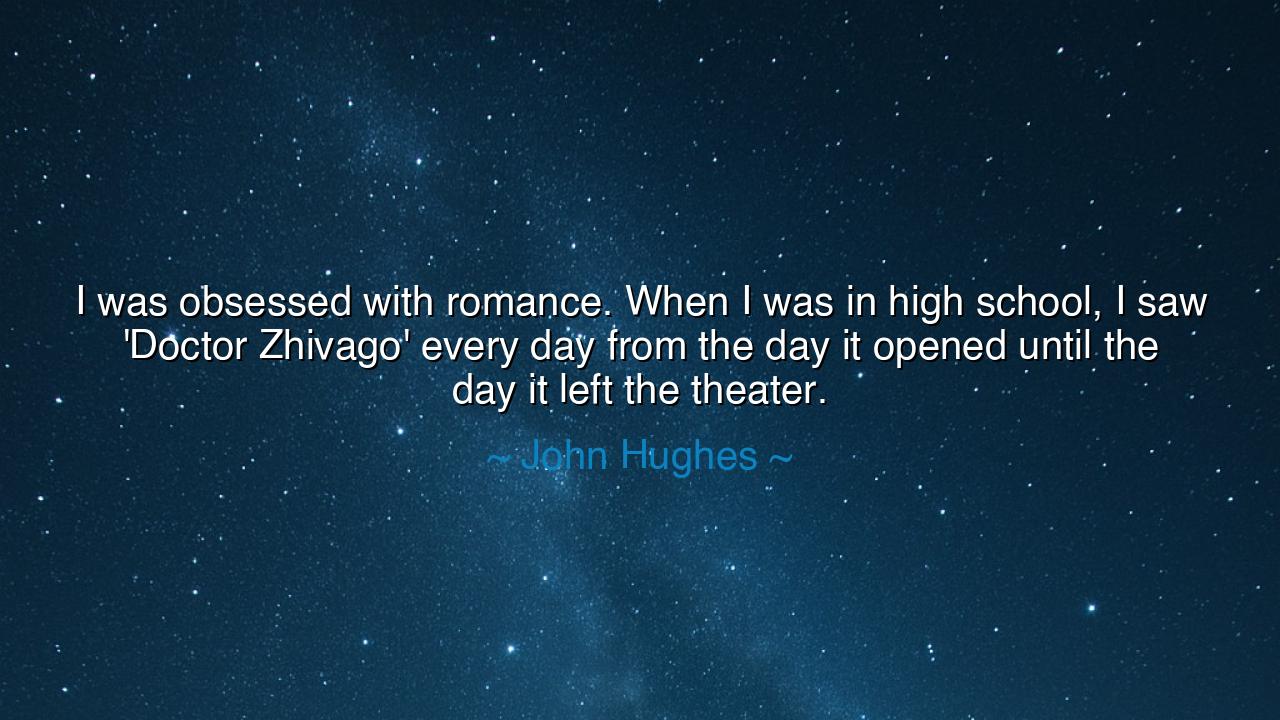
I was obsessed with romance. When I was in high school, I saw
I was obsessed with romance. When I was in high school, I saw 'Doctor Zhivago' every day from the day it opened until the day it left the theater.






When John Hughes confessed, “I was obsessed with romance. When I was in high school, I saw Doctor Zhivago every day from the day it opened until the day it left the theater,” he revealed the hidden furnace that shaped his imagination and his art. These are not the words of a casual admirer of cinema, but of a soul seized by obsession, carried daily into a world of longing, beauty, and tragedy. For Hughes, the story of Doctor Zhivago was not just a film—it was a mirror of desire, a temple of feeling, a revelation of what romance could mean in its grandeur and in its sorrow.
The origin of this passion lies in youth itself. In the tender years of high school, when the heart first awakens to longing, stories of great love strike with greater power than at any other time. Hughes, still shaping his identity, found in Doctor Zhivago a vision of romance larger than life: love surviving amidst war, tenderness in the midst of cruelty, passion bound by fate yet defiant of it. Each day he returned to the theater was not merely repetition, but pilgrimage. For the young heart, such stories are food and fire, shaping what one believes love might be.
History offers us parallels. The young Goethe, long before he became one of Germany’s greatest writers, was captivated by the passions of his age and poured them into The Sorrows of Young Werther. That novel, born of youthful obsession, stirred an entire generation, moving readers to tears, inspiring art, and even causing some to imitate the tragic fate of its hero. Like Goethe, Hughes shows us that obsession with romance in youth can fuel a lifetime of creation, shaping how one tells stories and how one understands the human heart.
The meaning of Hughes’s devotion to Doctor Zhivago is also a testimony to the power of cinema itself. A film can become more than spectacle—it can become a teacher, a guide, even a companion to one’s soul. Through the screen, Hughes encountered not only love, but the struggles of history, the cruelty of circumstance, and the resilience of the human spirit. These lessons would later find their way into his own films, where he gave voice to the yearnings of young people, crafting stories where romance, vulnerability, and longing were always at the center.
The lesson is clear: when a story grips you so deeply that you return to it again and again, honor that pull. It may be speaking to something in your soul that demands attention. For Hughes, his youthful obsession was not wasted time but the shaping of a vocation. He absorbed the rhythms of storytelling, the grandeur of cinema, the delicate balance between love and loss. What seemed obsession was in fact preparation, the forging of the artist he would become.
What, then, should you do? First, pay attention to the stories that move you beyond reason, that draw you back day after day, year after year. They may hold the key to your calling. Second, let yourself be seized by beauty without shame, for it is in obsession that passion is born, and in passion that greatness grows. Third, remember that romance—whether in life or in art—is not weakness, but strength, for it teaches the soul to yearn, to hope, to dream beyond the ordinary.
Thus, let Hughes’s words echo as teaching: “I was obsessed with romance.” Do not dismiss your obsessions, for they may be the sparks of your destiny. Like Hughes watching Doctor Zhivago, immerse yourself in what moves you, for there you may find the stories you were born to tell. And know this: romance, in all its grandeur and tragedy, is not only the theme of a movie—it is the eternal flame that gives meaning to the human heart.






AAdministratorAdministrator
Welcome, honored guests. Please leave a comment, we will respond soon